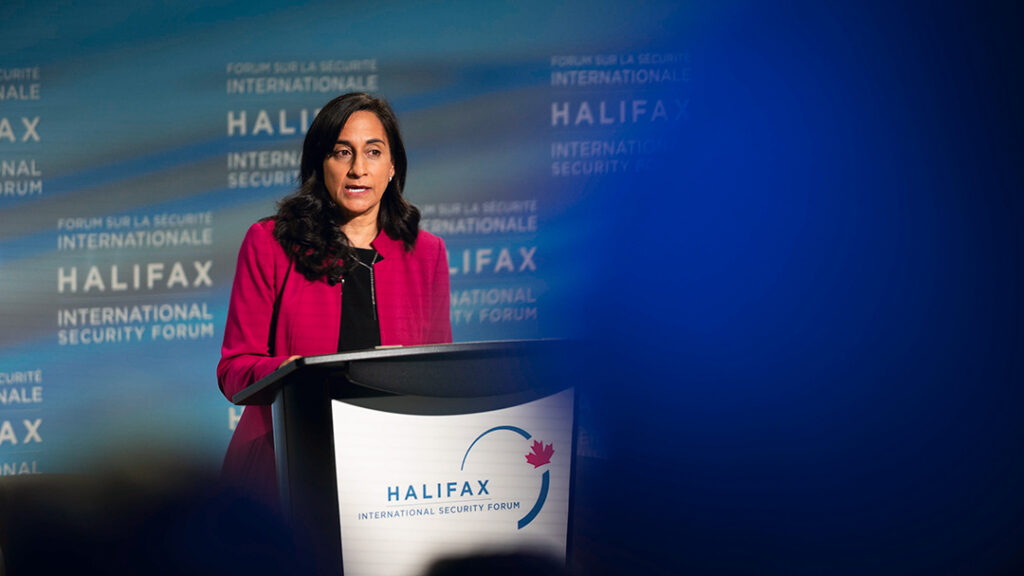THE WATCH STAFF
The defense ministers of Canada and Denmark have reaffirmed their cooperation on Arctic issues as the region’s strategic importance continues to grow.
The respective ministers, Anita Anand and Trine Bramsen, met virtually January 10, 2022, and emphasized the importance of unity among Arctic allies, according to a news release from the Canadian Department of National Defence.
Canada and Denmark are both members of the Arctic Council and the North Atlantic Treaty Organization (NATO).
The ministers, pictured, said they are committed to building on their defense relationship, both bilaterally and through NATO, according to the news release.
Canada shares more 1,800 miles of maritime border with Greenland, which is an autonomous country within the Kingdom of Denmark. Greenland and Canada also share cultural links through the Inuit populations on both sides of the border.
The Nares Strait, a 22-mile-wide channel, separates Canada and Greenland.
Anand said that Canada’s proposal to establish and host a NATO Centre of Excellence on climate security indicated the importance that Ottawa places on Arctic cooperation. Bramsen said the initiative has Denmark’s full support, according to the news release.
The Danish Joint Arctic Command (JACO) defends Greenland and the Faroe Islands, which also form an autonomous state within the Kingdom of Denmark. Copenhagen’s defense challenges in the Arctic are magnified because of the immense size of Greenland — the world’s largest island — and the region’s increasing accessibility because of climate change.
JACO also works closely with the North American Aerospace Defense Command and U.S. Northern Command by (USNORTHCOM), Alaskan Command and Canada’s Joint Task Force North in the defense of North America and Greenland, which is home to the United States Space Force’s northernmost outpost, Thule Air Base.
Greenland spans an area slightly greater than Austria, Belgium, Denmark, France, Germany, Ireland, Italy, Poland, Portugal, the Netherlands and the United Kingdom together, according to a 2017 report by the European Geosciences Union.
“My command is widely dispersed,” said Rear Adm. Martin La Cour-Andersen, the JACO commander, during a January 20, 2022, presentation as part of the Arctic Academic eTalks, a bimonthly virtual forum on key issues affecting the region. “I have got people and facilities in three different countries across five different time zones.”
(Pictured: Danish Rear Adm. Martin La Cour-Andersen, right, looks out the U.S. Coast Guard cutter Forward’s bridge during a tour of the Coast Guard Base in Portsmouth, Virginia, on May 5, 2021.)
Also complicating La Cour-Andersen’s mission: About 80% of Greenland is covered by a polar ice cap, and it has few miles of paved roads — many of which are in the capital, Nuuk.
“I must say that our day-to-day business is not a walk in the park,” said La Cour-Andersen, who before taking over command of JACO served as defense attaché to the U.S. and Canada.
JACO also plays an important role in securing the areas around Greenland and the Faroe Islands, La Cour-Andersen said, such as the strategically important Greenland-Iceland-U.K. (GIUK) Gap. The GIUK Gap is the open ocean between the three landmasses and is a maritime route of vital naval importance to NATO.
The Arctic Academic eTalks are co-hosted by USNORTHCOM and its magazine, The Watch; U.S. European Command; U.S. Indo-Pacific Command; and the North American and Arctic Defence and Security Network.
IMAGE CREDIT: PETTY OFFICER 1ST CLASS ANTHONY J. RIVERA/U.S. NAVY

